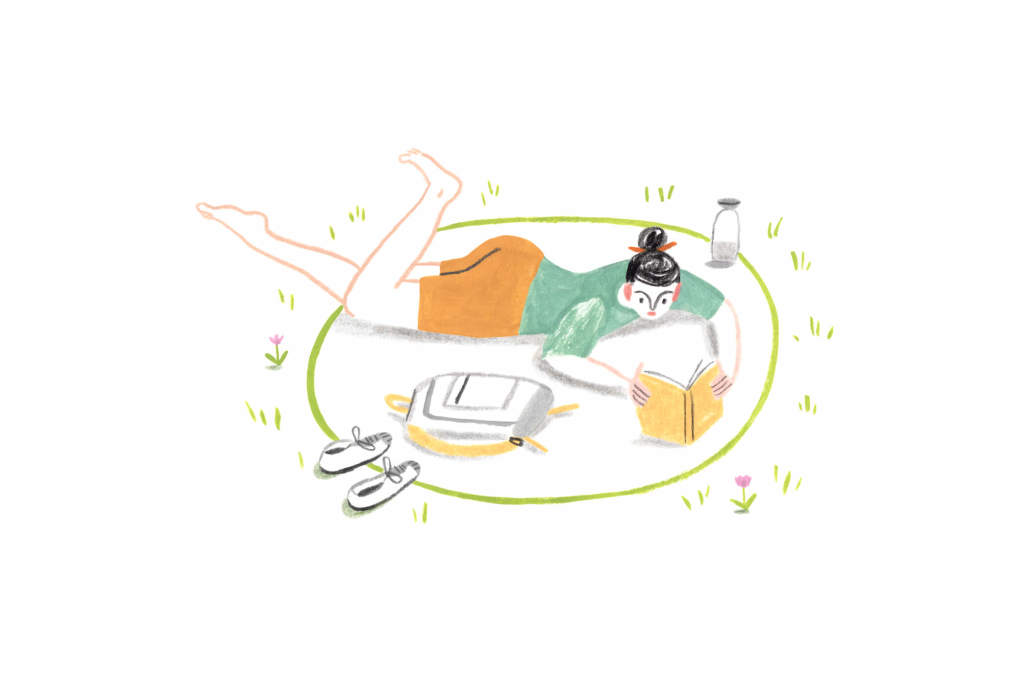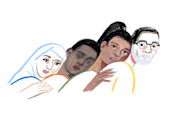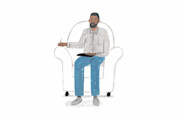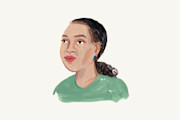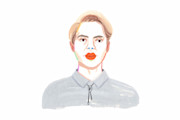When I was 23 my life fell apart. After years of overperforming, overachieving, ignoring my body, and traveling to the point that I didn’t have a home anywhere, I finally exhausted myself. I found myself on the other side of the world, fulfilling a Fulbright scholarship in a different country than I’d expected, and I was confused and directionless. Despite years of working towards a singular goal, I decided to quit. I booked a flight from Asuncion, Paraguay to New Orleans the very next day.
I was lucky that I hadn’t yet aged out of private insurance through my mother’s employer, and I still had some of the healthcare supplement left from my Fulbright for the duration of the year.
Once home, I began to comb through dozens of profiles of therapists online, looking for someone I could connect with and confide in. Leah’s profile signaled that she was an ally to the LGBTQ community, an advocate for racial justice and that she had experience counseling people who identified as polyamorous, sex workers, and feminists. I scheduled an appointment, encouraged by our shared values. At our first meeting, I was nervous but warmed up enough to fully settle back in her chair.
Our dynamic was different than those I’d had with therapists previously: I felt no need to lie
She sat across from me, receptive and collected. We talked about my family, quitting my job, and my pursuit of integrity. I didn’t want to end up in the same situation I was leaving—prioritizing institutional prestige over my own desires in life.
We talked about my relationship: queer and uncertain, unbound by the trappings of convention and commitment and confused by the other relationships my partners and I found ourselves in at the same time. We talked about who I was, who I wanted to be, how I wanted to write, and what that life might look like.
Our dynamic was different than those I’d had with therapists previously: I felt no need to lie this time. I requested my high school therapist’s notes, curious about the ways I had grown since then and whether my issues were cyclical. His notes identified me as strictly heterosexual on the Kinsey scale, though he had never bothered to ask. Now, at 23, I spoke openly with Leah about parts of my identity I’d struggled with. For the first time, I was able to be transparent about what mattered to me, the self I saw myself growing into, my politics, and even the self I once felt I had to hide.
My only responsibility was to show up and be honest.
I couldn’t have known it at the time, but that day marked the beginning of a different kind of a relationship, itself queer and uncertain: the relationship between my therapist—someone necessarily unknowable to me—and me—someone fundamentally in pursuit of self-knowledge.
I checked in with Leah periodically for three years, during which time I was actively developing a clear sense of my identity, a process borne out of and underwritten by the hours we spent together laughing, asking questions, challenging assumptions, and observing the changes—and growth—I experienced over time. At first, my Fulbright supplement covered our sessions entirely; when it expired, my mom’s private insurance co-pay subsidized them. My only responsibility was to show up and be honest.
Therapy became my space to practice consistency and commitment to myself, both on days when that was a struggle and on days I thought I was handling life well. I took my sessions with Leah for granted—imagining them infinite—until I approached a very real barrier to the possibility of me continuing treatment.

The day I turned 26, I became ineligible for coverage under my mother’s health plan. Her policy had held me over through the income volatility I experienced as I continued freelancing through a global pandemic and a national recession. I was ineligible for Medicaid due to my income, despite ongoing economic uncertainty and the rapid dwindling of my own financial reserves.
My unstable income makes seeking quality healthcare an untenable burden—a systemic issue that poses a very real challenge to freelancers and gig workers in ever-growing numbers.
Economic instability, a fact inherent to the nature of my work, made the monthly premium for the cheapest plan I qualified for under the Affordable Care Act an unimaginable luxury. The policy boasted a $6,500 deductible to boot, itself an impossible sum.
I write this now, uninsured, along with approximately 29.6 million other Americans, a figure that has almost certainly risen as a result of last year’s widespread layoffs and economic casualties from the COVID-19 fallout.
My unstable income makes seeking quality healthcare an untenable burden—a systemic issue that poses a very real challenge to freelancers and gig workers in ever-growing numbers.
According to a study by Edelman Intelligence, commissioned by the Freelancers Union and Upwork, some 57 million Americans engaged in temporary, supplemental, project-based, or contract work in 2019, representing 35% of the workforce in the United States. Of those workers, 28% freelance full-time, and thus are ineligible for any healthcare plans provided by traditional employers.
In the same study, 17% of freelancers did not have healthcare coverage at the time in which they were surveyed, which, when compared with 8% of Americans in the general population lacking coverage, reported through the US Census Bureau, illustrates a disproportionate problem.
Mental health is, I’ve come to find, an ongoing journey
This is a result of an economy where freelancers are burdened with the responsibility of advocating for their rights, livelihoods, and workplace protections, often with minimal support, despite collectively contributing nearly $1 trillion to the annual GDP.
These statistics beg the question: When will our government and the employers of gig workers create new regulations, incentives, and provisions to catch up to our changing economy? When will our society prioritize access to essential resources like affordable healthcare for the unemployed and for workers who do not fit into the model of a traditional workforce? In the meantime, this issue results in inadequate provisions for our country’s collective wellbeing, a lack of coverage for the most vulnerable among us, and a dearth of resources specifically targeted towards helping the untraditionally employed to meet their basic needs.

In my case specifically, this systemic negligence means that I’ve been priced out of the mental healthcare I’ve pursued diligently with a provider who understands my lifestyle and identity. I do not assume that other free and low-cost alternatives in the New Orleans area, largely subsidized by and affiliated with religious institutions, prioritize hiring on providers with the same progressive views as Leah.
The understanding I gained in therapy about holistic wellbeing is that it is not a final destination we ultimately arrive at, suddenly whole and healed from the experiences we have undergone. Mental health is, I’ve come to find, an ongoing journey underwritten by a commitment to self-care and self-examination, supplemented by professional care when the inevitable road bump pops up. In the absence of health insurance, I am left with only the considerable progress that I’ve made and the lengths I have yet to go.
CNBC US Source. (2019). Freelancers earned nearly $1 trillion in 2018: Survey. Retrieved from: https://www.cnbc.com/video/2019/10/04/freelancers-earned-nearly-1-trillion-in-2018-survey.html
Upwork. (2019). Freelancing in America: 2019. Retrieved from: https://www.slideshare.net/upwork/freelancing-in-america-2019/1
US Census Bureau. (2020). Health insurance coverage in the United States: 2019. Retrieved from: https://www.census.gov/library/publications/2020/demo/p60-271.html
